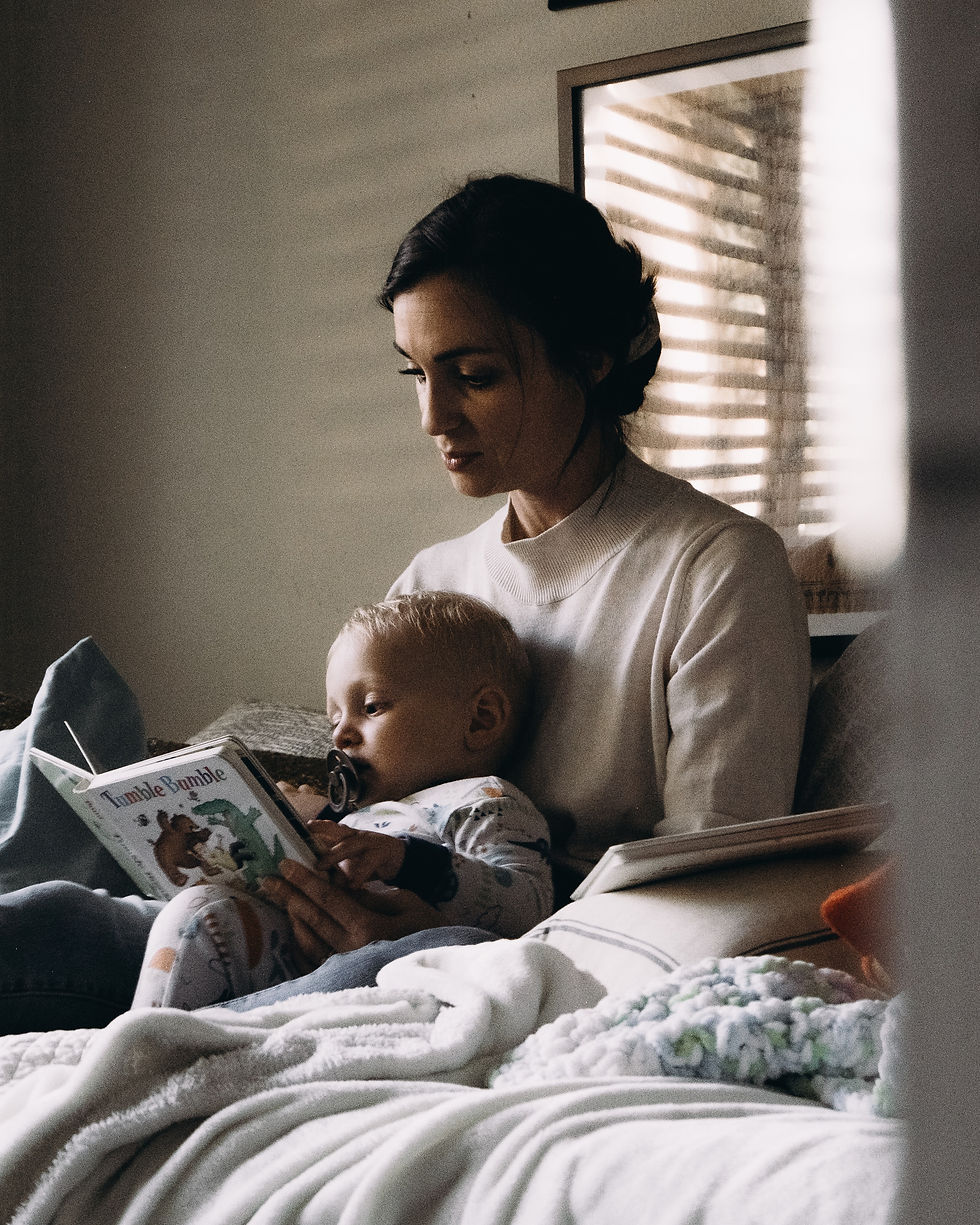Should I sleep train for my Mental health?
- Noeline Marais

- Feb 23, 2022
- 3 min read
Updated: Mar 2, 2022
Important: If you are suffering from (or suspect you may be struggling with) PMAD's, please seek help and support from your trusted health care provider*

I recently posted on Instagram: “Is poor sleep contributing to your mental health issues? Or is your mental health struggles contributing to your sleep deprivation?” and I would like to unpack this a bit more.
Sleep and mental health are unquestionably intertwined and according to the sleep foundation it is becoming clear that there is a bidirectional relationship between sleep and mental health in which sleeping problems may be both a cause and consequence of mental health problems. [2]
Did you know PMAD’s are the leading complication following childbirth, with at least one in five of women experiencing this? But only approximately 15% of mothers get professional support or treatment? PMAD’s can show up at anytime from conception through the first year post-partum and includes depression, anxiety, OCD, PTSD after birth trauma and post-partum rage (this is considered a symptom of PPA or PPD). My point is, it’s very common. It can also be debilitating and really serious.
It's easy to blame it all on sleep deprivation, but the truth is, there are many factors that contribute to PMAD’s. It’s also easy to blame our baby’s night wakes and disrupted sleep for our sleep deprivation and feelings of exhaustion. When in reality the depression or anxiety you’re experiencing is probably contributing more to your sleep deprivation than your baby’s sleep.
Furthermore, research actually shows that maternal anxiety plays a big role in infant sleep and can make babies wake more often.[1]
Here are some effects PMAD’s can have on sleep that have nothing to do with your baby:
Insomnia (according to the sleep foundation, around 75% of people who suffer from depression, also struggles with insomnia)
Increased sleep latency (Having a hard time falling asleep) or waking up earlier than necessary. According to the sleep foundation Anxiety disorders have a strong association with sleeping problems. Worry and fear contribute to a state of hyperarousal in which the mind is racing, and hyperarousal is considered to be a central contributor to insomnia. Sleep problems may become an added source of worry, creating anticipatory anxiety at bedtime that makes it harder to fall asleep. [2]
Disturbed sleep, like nightmares, panic attacks, etc. [3]
Lethargy: feeling exhausted, regardless of how much you slept.
The fact is: your baby’s sleep isn’t causing your mental health issues, but improved sleep could help improve some of your symptoms.
Before deciding to sleep train your baby for the sake of your mental health, let’s try to optimise your rest and improve your own sleep.
Improve your sleep hygiene – no blue light (screens) before bed, adequate wind down time, relaxation activity before going to bed
Earlier bedtime
Front load your days
Keep a notebook by your bedside table to write down things you need to remember (instead of stressing about them or typing them on your phone)
Check your nutrition: post partum depletion is a real thing. Lacking in certain nutrients can not only have affect your sleep, but can also contribute to feelings of exhaustion and brain fog.
Have an emergency plan (or even an emergency fund)– support you can call on when you need it. Food delivery, house cleaning services, someone to watch the baby for an hour so you can have a break, etc.
Even if you don’t plan on bedsharing, if you are breastfeeding I always recommend setting up your sleep space for the possibility of bedsharing. I realise it’s not for everyone, but safely bedsharing can be an amazing tool to aid in the optimization of your rest.

We often hear that parental mental health is the reason for some parents' decision to sleep train. However, research has shown (thoroughly) that PMAD’s cannot be caused or treated with sleep alone. Sleep deprivation can certainly add to feelings of depression, anxiety, rage, etc.; however, putting strategies to cope with sleep deprivation in place; learning what is normal and adjusting your expectations has been found to be more helpful than having a baby who “sleeps better”. It has also been reported that sleep training worsened or triggered PMAD’s in many mothers (especially PPD and PPA).
The most important thing I want you to take from this, is that any PMAD symptoms you may be suffering from is treatable and there are many options available that do not impact breastfeeding (if that is something keeping you from seeking treatment). Sleep can certainly be part of the puzzle when we look at ways to get you back on track, but it’s important that you reach out to your trusted health care provider to find a treatment plan that works for you.
References:
1. [https://www.telegraph.co.uk/news/health/news/9206423/Anxious-mothers-may-disrupt-babies-sleep-not-other-way-round-researchers.html]
2. [https://www.sleepfoundation.org/mental-health]
3. https://www.sleepfoundation.org/mental-health/ptsd-and-sleep



Comments